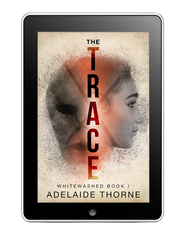|
Why do we write? Well, for the same reason that we read: we believe in stories. My story started cooking in my head long ago, but I never had the will to do anything about it—until someone believed in me. A pinch of belief mixed with an ounce of determination (and, most notably, eight million heinous drafts) can produce a book.
It all comes back to the gap in my bookshelf. A slit between my books judged me every day, grumbling, “Why haven’t you filled me yet?” My excuse typically had something to do with time. I never seemed to have enough of it. To any writer struggling to put words on paper, time does exist; you only have to grab it when it finds you. So, about that bookshelf gap…. It demanded that I fill it with the story I’d always wanted to read, the story no other book could quench. This story of mine revolved around a girl whose name shifted and bounced, whose personality wavered as I grew. Her authenticity, however, remained. I often took issue with the YA protagonists of my youth—too bland, too faultless, too accepting of the mantle thrust upon them, too hardcore, or too “Why me?” My own brand of perfect protagonist floated in the “Just hang out there until I say you can leave” part of my brain. This protagonist struggled to jump right into the “conquering hero” mold; she could be cringe-worthily cheesy and awkward; she had faults that she tried ignoring; she got scared when the time to be heroic came; and, she was human. By that I mean ordinary, flawed, and most of the time unsure whether or not any of her efforts would make an impact. This protagonist floated in and out of the ideas my brain conjured. One day, she found her story and stayed put. Take a covert operation of powerful humans, an army of even more powerful enemies, an ordinary girl who suddenly changes, a best friend who needs protecting, and you’ve got the stirrings of Ella’s story. It’ll twist, characters will make mistakes, truths will find the light, and bad guys will reveal their humanity. This story might make you groan, laugh, grimace, cry, roll your eyes, or throw something—like the book itself. Hey, paperback is durable; it can withstand a few hurls against the wall. Most importantly, though, The Trace will nudge something in you—be it good or bad—because it’s a story and that’s what stories do. The Trace is Ella Kepler’s tale—no doubt about that—but she’s only a fragment in a plot that expands the more she uncovers. She grows, she retrogrades, she falls, and she falls again—and the story around her continues, because the world will turn, even if we stop. My hope is that Ella’s world will turn with you. *This post was originally published at Evolved Publishing's website here* JOIN ADELAIDE'S NEWSLETTER!YOU'RE CONNECTED TO ADELAIDE THORNE!
0 Comments
Leave a Reply. |
Whitewashed Book ICategories
All
|


 RSS Feed
RSS Feed